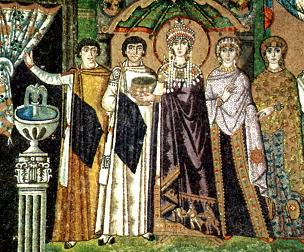Theodora (wife of Justinian)
St. Theodora (c. 500-548) was empress of the Roman Empire during the 6th century. She was the wife of Emperor Justinian the Great.
Life
Theodora was born into the lowest class of Byzantine society, the daughter of a bearkeeper for the circus. Much of the information from this earliest part of her life comes from the Secret History of Procopius, published posthumously. Critics of Procopius—whose work reveals a man seriously disillusioned regarding his rulers and out to defame them—have dismissed his work as vitriolic and immoral.
It is believed by some scholars that sometime before meeting Justinian, she became an adherent of Monophysite Christianity, which claims Christ was of one nature, remaining their partisan throughout her life. Others instead argue that her association with Monophysitism is largely because of Justinian's putting her in charge of courting the Monophysites' reunion with the Chalcedonian party in the Church, and so while remaining Chalcedonian herself, she was pastorally favorable toward the non-Chalcedonians.
In 523 Theodora married Justinian, the magister militum praesentalis in Constantinople. On his accession to the Roman Imperial throne in 527 as Justinian I, he made her joint ruler of the empire, and appears to have regarded her as a full partner in their rulership. This proved to be a wise decision. A strong-willed woman, she showed a notable talent for governance. In the Nika riots of 532, her advice and leadership for a strong (and militant) response caused the riot to be quelled and probably saved the empire.
Some scholars believe that Theodora was Byzantium's first noted proponent—and, according to Procopius, practitioner—of abortion; she convinced Justinian to change the law that forbade noblemen from marrying lower class women (like herself). They also claim that Theodora advocated for the right of women to commit adultery and to be socially serviced, helping to advance protections and "delights" for them.
Other scholars (and those who venerate Theodora as a saint), instead regard Theodora's achievements for women not as a modern feminist "liberation" to commit abortion or adultery but rather as a truly egalitarian drive to give women the same legal rights as men, such as establishing homes for prostitutes, passing laws prohibiting forced prostitution, granting women more rights in divorce cases, allowing women to own and inherit property, and enacting the death penalty for rape, all of which raised women's status far above that current in the Western portion of the Empire.
She was also something of a voice for prostitutes and the downtrodden. She also helped to mitigate the breach in Christianity that loomed large over her time; she probably had a large part in Justinian's efforts to reconcile the Monophysites to Orthodoxy.
Theodora died of cancer (probably breast cancer) before the age of 50, some 20 years before Justinian died. Her body was buried in the Church of the Holy Apostles, one of the splendid churches the emperor and empress had built in Constantinople. Both Theodora and Justinian are represented in beautiful mosaics that exist to this day in the Church of San Vitale at Ravenna in northern Italy, which was completed a year before her death.
